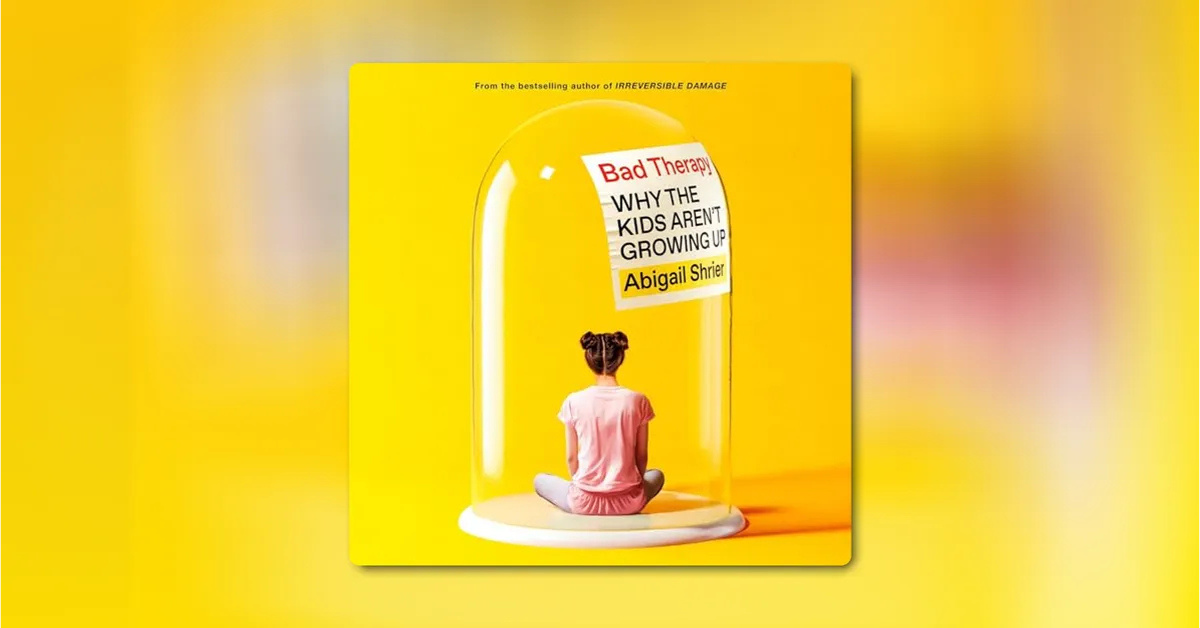Bad Therapy: Why the Kids Aren’t Growing Up
The problem with mental health is increasingly experienced by more and more children, thus their parents seek treatment. But occasionally the treatment breaks down.The question remains: Bad Therapy: Why the Kids Aren’t Growing Up. Most of the children fail to develop normally in emotions, behavioral, or mental aspect.But why?
The current paper considers the reasons that cause certain treatments to be harmful to children rather than beneficial. In other times, caregivers intend to care after children, yet what they do is even worse. What are the errors involved and what can we do about it?
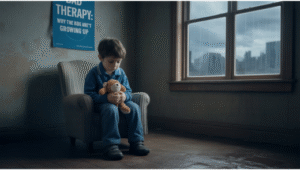
Bad Therapy: Why the Kids Aren’t Growing Up – Abigail Shrier’s Perspective
According to Abigail Shrier, bad therapy (i.e., ineffective treatment of mental health in current society) is a book that states that certain practices not only disregard unique needs of every child (i.e., their own needs) but also go against them. When clinicians employ gender-affirmative treatment of children having gender dysphoria, she observes that clinicians can be harmful should they act carelessly. The children might be deceived or pressured into making resolutions that they are not prepared to initiate thereby retarding emotional and mental development.

Bad Therapy: Why the Kids Aren’t Growing Up – Key Quotes to Consider
To understand Bad Therapy: Why the Kids Aren’t Growing Up, it’s essential to consider the words of those who have lived through its consequences.We are reminded of the situation in case of mishaps in therapy due to proverbs:
- The psycho therapy must foster self reliance, not addiction.
- Storying children that only therapy is the solution to the difficulties leave children with less capability to endure.
- An effective therapy imparts good emotional control and decision-making.
These quotations emphasize the idea that a therapy must allow children to learn how to be in control of their lives and be able to solve their problems instead of relying on others.
Bad Therapy: Why the Kids Aren’t Growing Up – A Review of Modern Approaches
Bad Therapy: Why Kids Aren t Growing Up, in this case, indicates cases of short-term assistance rather than eternal solutions provided by treatment. Several parents choose to enroll their children in programs that do not bring about any changes.
Providing medicine, which is one of the most common mistakes, is an example. When it comes to the treatment, medication assists in the improvement of symptoms, ancillary to the treatment of the underlying problems. Emotions As labelers and behavior-list therapists dismiss emotions, they and their clients will lag behind in emotional development, pulled through life emotionally ill equipped.
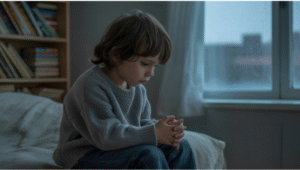
The Dangers of Labeling: Why Bad Therapy Prevents Kids from Growing Up
Diagnostic terms have the capacity to inhibit emotional development. Once a therapist labels a child an ADHD or anxiety, the child has a tendency to gradually think of himself as labeled and become addicted to therapy. In the case of stem cell treatment of an autistic child, the aim is not only to cure the diagnosis, but to cure the underlying condition, and stem cells have the ability to assist the brain in its development. Personalized therapy, however, should combine the stem cell treatment in promoting growth and independence.
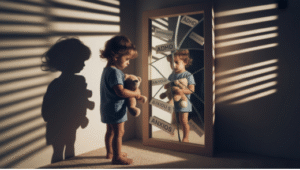
The Long-Term Effects of Bad Therapy: Why the Kids Aren’t Growing Up
Therapy which does not work can be harmful to children. They can later on live with the same issues when they are older. Part of the problem lies in the fact that when doctors or counselors turn a blind eye on the actual causes of emotional distress, they do not get avenues to cope. Due to this, they tend to rely upon others to make them feel better most of the time, and this does not help in the adult world. Moreover, they fail to teach these children useful methods of dealing with and managing their emotions and thus, they find it difficult to cope with their bad times in the future.
Can Bad Therapy Impact a Child’s Social Development?
Book review: Bad Therapy: Why the Kids Aren t Growing Up reveals the importance of social skills in therapy. Majority of the children attend a treatment session but fail to practice the skills in the home or school. They can be shy or fail to make friends in case they are not playing with friends, not going to social events, or do not talk in a confident manner. They can also skip social functions or experience embarrassment in the street. Good therapy imparts these social skills to children and allows them to manage their emotions when in social gatherings.
Bad Therapy: Why the Kids Are6+n’t Growing Up – The Need for Personalized Therapy to Help Kids Grow Up the Right Way
One of the challenges that affect therapy currently is the one-fits-all paradigm. All children are unique and they have their own needs, experiences and temperament. The type of therapy that is most effective is an individual person-specific problem centered therapy. The therapists are supposed to manipulate their approach to suit the personality and emotions of the child in addition to the developmental stage. Under personalized therapy, the emotional strength of children improves and they grow up as well adjustable adults.
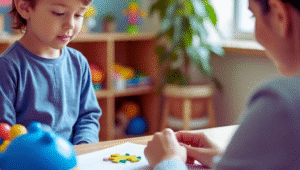
Bad Therapy: Why the Kids Aren’t Growing Up – The Role of Parents in Supporting Effective Therapy for Their Kids
The primary place of assistance to their children in getting the right therapy lies in the hands of parents. The parents will lend support to the therapist and the child when participating in therapy. They are able to exchange comments and assist in selecting the most effective treatment plan for their kid. The involvement of parents makes the therapy even stronger and increases the probability of success.
Bad Therapy: Why the Kids Aren’t Growing Up – Rebuilding a Child’s Development: Moving Forward from Bad Therapy
Just because you received a poor treatment does not mean that it is all over with you yet. With proper assistance, even children who have undergone improper treatment procedures can develop emotionally, and learn how to cope, where the coping skills are concerned. Healing the emotional and psychological state of a child involves correct selection of the therapy genre as well as handling of the untraumatized emotional instructions. Through employing intimate focus on child centered therapy, parents and professionals will be able to restore confidence and emotional strength in children so that they would adopt wholesome adulthood.
Bad Therapy: Why the Kids Aren’t Growing Up – The Influence of Social Media and Peer Pressure
Since the social media is becoming more common, online peer pressure, false ideals, and the transmission of negative advice may furthermore undermine the mental and emotional well-being of children. Problems that the social media causes to the psychological well being of a child such as the loss of self worth and unsoundness of emotions may not be extensively tackled during therapy thus rendering children to emotionally develop at a slower pace.
Bad Therapy: Why the Kids Aren’t Growing Up – The Role of Schools in Supporting Mental Health
Schools are important in identifying children that require therapy and ensuring that they receive appropriate assistance. Emotional distress may be the first to be noticed by school counselors, although they may not always provide effective therapy. That is why, schools ought to collaborate with therapists in such a way that children can be provided both with academic and emotional welfare.
These additional issues give a greater insight into the explanation of the reasons why children struggle to develop emotionally and mentally:
- Family life
- School problems
- Having an ill relative
Conclusion: Bad Therapy: Why the Kids Aren’t Growing Up – The Need for Proper Therapy to Foster Growth in Children
In conclusion, Bad Therapy: Why the Kids Aren’t Growing Up highlights the critical need for a shift in how we approach mental health therapy for children. Treatment does not only involve instant solutions. It should seek long-term transformations of a child on the level of emotions and growth. In case of poor therapy, it may retard this growth of a child both emotionally and socially. We can make children grow to be adults ready to face the challenges of life through decisions to use custom-made and science-based approaches.
FAQs
What are the ways to recognize bad therapy on the part of parents?
Children are to be watched to make sure their parents know that the therapist does not pay attention to the child’s needs or finds shallow-level problems and does not address them.
What are the effects of poor therapy in the long term on children?
To develop emotional stagnation, an absence of resilience, and an over-dependency on a therapy can occur. All these can deny a child the ability to acquire coping skills in preparation for adult life.
Will poor treatment harm the social skills of a child?
Yes. Ineffective treatment might restrict child learning to build a social skill thus making positive social interaction and the formation of good relations to be more difficult.
What can parents do when their kid is undergoing poor therapy?
Parents ought to request a second opinion, think about changing the therapist, and continue engaging in identifying a course of therapy that will actually deal with the emotional needs of their child.

